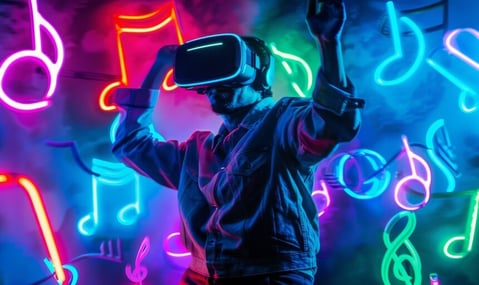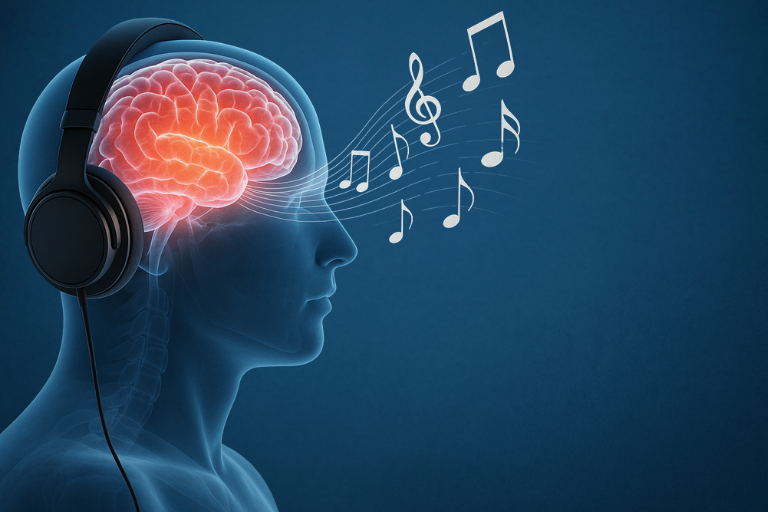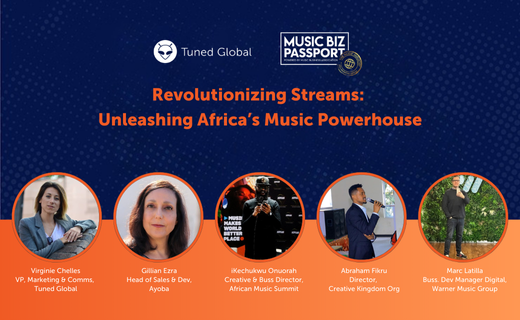
Gaming now earns more than music and film combined — and music is becoming core to gameplay. Music Business Worldwide covered the interesting conversation from the Music Tectonics conference, where leaders from Riot Games, Epic Games, and Tuned Global and Vickie Naumann unpack how in-game music, virtual bands, and licensing tech are reshaping fan engagement and artist discovery. Read a full summary of their discussion or watch the full panel video.
This year’s most anticipated entertainment release isn’t an album, a movie, or a TV series. It’s a video game.
Rockstar Games’ Grand Theft Auto VI is projected to generate by DFC Intelligence $1 billion in preorders ahead of its Fall release and over $3 billion in its first year.
After 28 years since the release of the first GTA game, the franchise’s extraordinary commercial success is indicative of gaming’s continued cultural significance and dominant positioning in the wider entertainment business.
As noted in a 2024 report from Dentsu Research, gaming generates more money annually than the film and music industries combined.
The video game industry generated $184 billion in 2023, versus the $33.9 billion in global box office revenues and $28.6 billion (IFPI) generated by the global recorded music industry (2023).
Gaming is BIG business, and from in-game placements, to scores, official soundtracks, virtual merch, and virtual concerts, it’s a big opportunity for artists, songwriters, and music rightsholders.
But music has, of course, also become a central feature of gameplay, as highlighted by GTA’s in-vehicle radio stations or popular soundtracks associated with everything from the legacy Tony Hawk Pro Skater series to contemporary hits like EA Sports’ FC and NFL Madden franchises.
Experts on the convergence of gaming and music highlighted these opportunities for both sectors during a panel discussion at Music Tectonics in Los Angeles.
Among them were Spiro Arkoudis, Chief Revenue Officer at Tuned Global; Emily Levy, Head of Global Partnerships at Epic Games; Crossborder Works founder Vickie Nauman; and Danny Silverman, Head of Music Legal Affairs at Riot Games. Vickie Nauman pointed out that “there are 3 billion global gamers,” but that the “industry is a little bit similar to the music industry where there’s a handful of huge gaming studios,” and then a “really long tail” of “diverse game developers” focused on various platforms, from mobile to console, VR and more.
Vickie Nauman pointed out that “there are 3 billion global gamers,” but that the “industry is a little bit similar to the music industry where there’s a handful of huge gaming studios,” and then a “really long tail” of “diverse game developers” focused on various platforms, from mobile to console, VR and more.
This long tail of game makers, with the potential to pay for licenses to feature music in their games, means that “engaging the music industry and the gaming industry can be really challenging,” added Nauman.
Solving licensing issues
Speaking during the panel discussion, Spiro Arkoudis noted that Tuned Global, which has emerged as a key player at the intersection of the music and gaming worlds, has experienced “more and more gaming companies wanting to engage with commercial music” over the past couple of years.
As a B2B cloud music technology platform, Tuned Global helps game developers integrate fully licensed music and advanced APIs into their platforms.
 “We work with gaming to provide infrastructure, enabling music experiences for gaming partners and clients of ours and [facilitate] a relationship with the licensing side,” explained Arkoudis during the panel.
“We work with gaming to provide infrastructure, enabling music experiences for gaming partners and clients of ours and [facilitate] a relationship with the licensing side,” explained Arkoudis during the panel.
He added that the company works with gaming companies to address how they “can license music, how they get access to millions of assets, but also [to provide] the engine room behind that.”
An example of Tuned Global’s prime positioning in this space was its collaboration with personalised music for games company Reactional Music, which focuses on music personalisation and dynamic in-game soundtracks that adapt to gameplay in real-time.
Additionally, via its case study with FanLabel, Tuned Global demonstrated its ability to “reduce backend music technology costs” while enhancing user engagement.
Meanwhile, the company’s recent partnership with music game Realize Music, which signed strategic partnerships with Universal and Warner Music in December and launched on Meta Quest in North America just last week, highlighted Tuned Global’s deeper expansion into this space via VR headsets.
Tapping into gaming fan communities
Elsewhere on the panel, Danny Silverman of Riot Games explained the difference in significance between a partnership or placement of music in a game versus a big sync in a popular TV show or film.
 “The big and most popular games are not just a placement [but rather] a culture,” said Silverman “It’s a lifestyle for the people that play them. There are hundreds of millions of people playing. One of Riot Games’ flagship franchises, League of Legends, counts around 131 million monthly players. “This is more of like a sport,” added Silverman. “There are leagues and professional leagues. So it’s not just a show that you watch one time and then maybe if you’re a super fan, you’ll rewatch it a second time. People interact with their friends socially around these games.”
“The big and most popular games are not just a placement [but rather] a culture,” said Silverman “It’s a lifestyle for the people that play them. There are hundreds of millions of people playing. One of Riot Games’ flagship franchises, League of Legends, counts around 131 million monthly players. “This is more of like a sport,” added Silverman. “There are leagues and professional leagues. So it’s not just a show that you watch one time and then maybe if you’re a super fan, you’ll rewatch it a second time. People interact with their friends socially around these games.”
“So to have a musical association with that game is not just visibility to that artist or to that song, but it’s an association with an IP that is so important to millions of players’ and fans’ lives.”
Riot’s in-house music division Riot Games Music also produces original music, by virtual bands like K/DA, Pentakill, and True Damage. K/DA, unveiled in 2018 to perform within the League of Legends game, features singers Madison Beer and Jairan Burns, along with I-dle members Miyeon and Soeyeon. The group’s debut single Pop/Stars has been streamed over 370 million times on Spotify and has over 600 million YouTube views.
Riot also works with superstar artists for its League of Legends World Championship anthems, like K-Pop group NewJeans, Imagine Dragons and Lil Nas X.
Off-platform exposure and the ‘ripple effect’ of including music in games
Elsewhere during the panel discussion, the music and gaming execs pointed to the potential off-platform benefit of having music included within a game.
Tuned Global’s Spiro Arkoudis summed it up as “discoverability and the ripple effect” on streaming platforms after music is associated with a game. “We’re seeing a lot of that,” said Epic Games’ Emily Levy.“Luminate published a stat that when Fortnite put a song into the game as a purchasable track, which we call Jam tracks, and we rotate them in and out of the game on a daily basis, rightsholders were seeing an 8.7% lift in consumption off-platform.
“We’re seeing a lot of that,” said Epic Games’ Emily Levy.“Luminate published a stat that when Fortnite put a song into the game as a purchasable track, which we call Jam tracks, and we rotate them in and out of the game on a daily basis, rightsholders were seeing an 8.7% lift in consumption off-platform.
“And that was just simply by putting a song in the game, not through a massive artist partnership or a big concert.”
Levy noted that Epic Games, maker of hit battle royale title Fortnite, now “operate[s] an always-on music business.” Fortnite has hosted several virtual concerts by superstar artists, starting with its first one featuring Marshmello in 2019, which set a precedent for large-scale virtual concerts.
Travis Scott’s in-game performance took it to another level a year later, attracting 27.7 million viewers across five pre-recorded ‘sets’.
“Music has played a huge role in Fortnite since the game launched [in 2017],” said Levy.
“We’ve always known that music was important for connection and for self-expression and we have experimented in a variety of ways.”
One of Epic’s music-related properties is Fortnite Festival, which was developed by Rock Band and Guitar Hero-maker Harmonix, which Epic acquired in 2021.
As a result of the existence of Fortnite Festival, Fortnite sells Jam tracks in the game and has partnered with artists from The Weeknd to Lady Gaga, Billie Eilish, Metallica and Karol G.
“We are thinking about music differently,” said Levy. “At our core, we believe music is a part of the social fabric at Fortnite.
If you're curious about licensing or need guidance on integrating music into games, we're here to help.
Feel free to reach out with any questions or thoughts on enhancing your gaming experience with music.
This article was first published on MusicBusinessWorldWide.com





